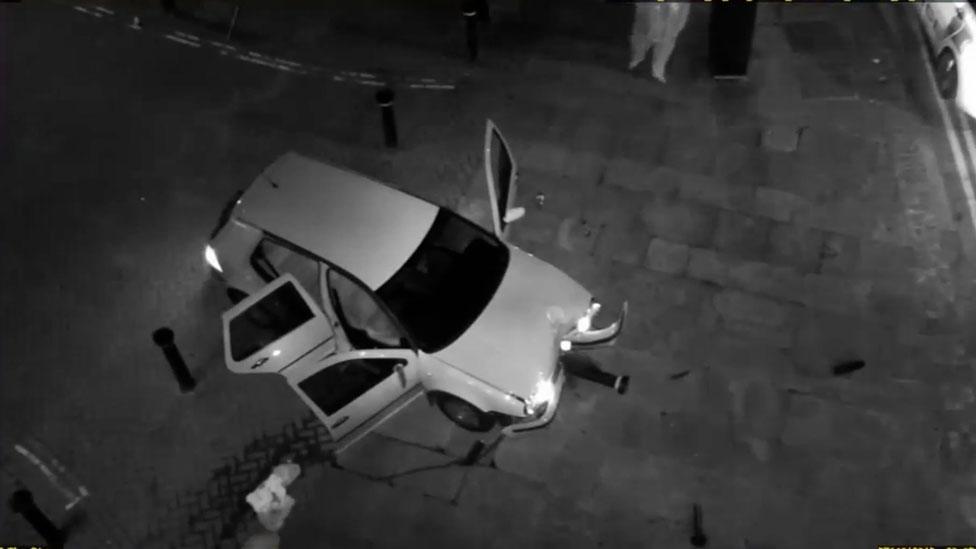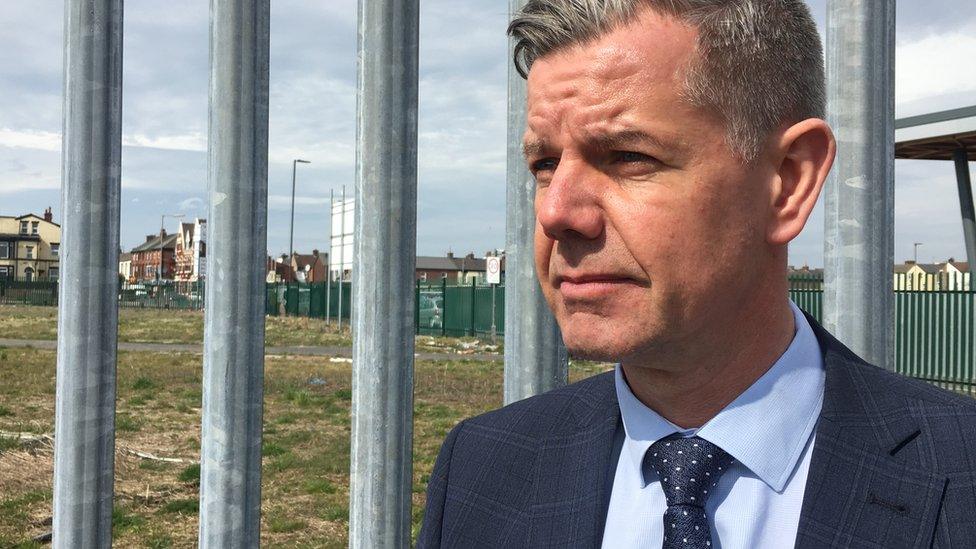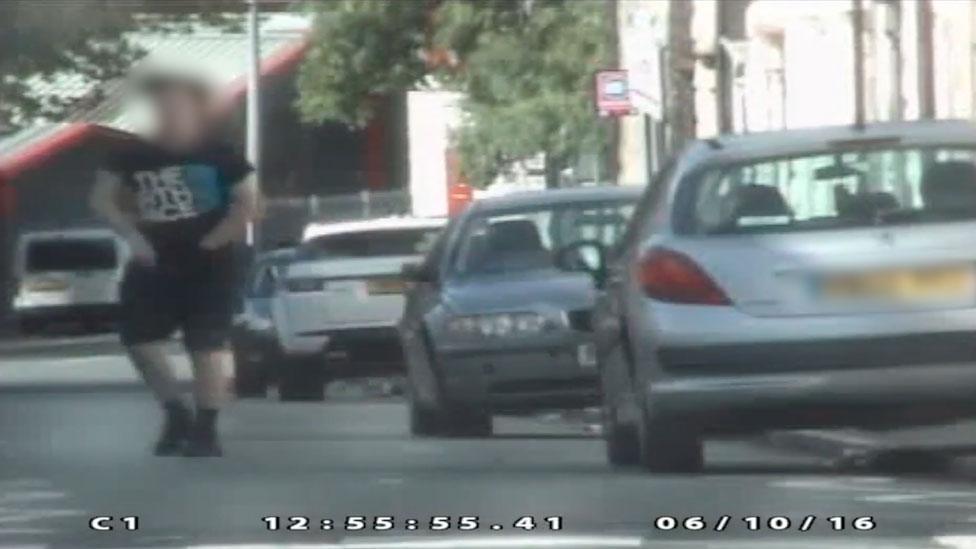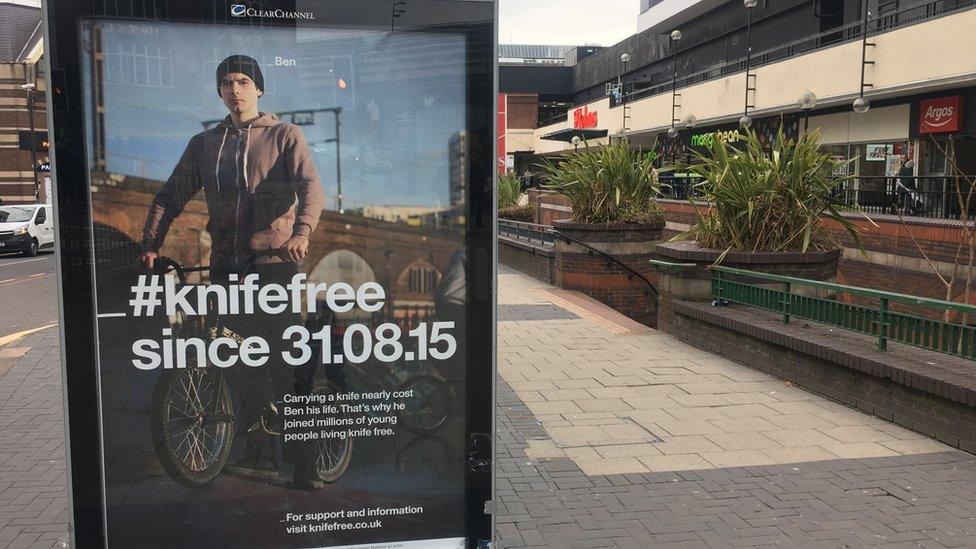Tackling serious violence: 20 years of promises
- Published

Crash: Teenager tried to escape gang
If you want to understand the scale and the complexity of the challenge in reducing serious violent crime on the streets, listen to the experiences of police officers like Det Supt Lee Turner.
Look at the case of a 15-year-old he recently investigated, who ran through the streets of a Lancashire town fearing he was about to be stabbed to death.
And consider the two decades of government initiatives that have all, more or less, talked about the same thing.
Det Supt Turner investigates serious organised crime for Merseyside Police.
And one of the biggest challenges he faces is pursuing organised crime groups that coerce teenagers into selling drugs for them across an entire region - a phenomenon known as "County Lines".
I drove around Liverpool's Anfield with Det Supt Turner so he could explain how one crime group had ruthlessly used this business strategy to make huge piles of cash - and meted out violence week after week to anyone who got in their way.

Det Supt Lee Turner: Hunting gangs, trying to stop violence
"This is their home turf, and they had a stranglehold on the community," he says.
"If you were out of line then you would be met with severe violence, against you and potentially members of your family too."
For years, the group run by Edward Murphy and others made huge profits that funded a lifestyle at odds with their apparent circumstances: £100,000 four-wheel drive cars, designer goods, partying and, most importantly for our story, gifts for vulnerable teenagers - such as a new phone or trainers if they did a gang member a favour.
"The group would recruit 14 and 15-year-old boys generally from broken homes or difficult situations, mental health issues," says Det Supt Turner.
"They were attracted by the perceived wealth. Once these young people were in the gang and trusted to look after packages - usually drugs - they would be stolen from them.
"The drugs were stolen by their own gang - and so the teenagers were in debt bondage.
"And then they had to work for nothing to pay off that debt. They had nowhere to go, they were trapped."
Once under a gang's control, teenagers could be put to work on the "County Lines".
It's a simple idea. Drugs gangs expand from city to country with the help of mobile phone "lines" dedicated to each target market.
The phones are manned in each location by a young person, a teenage criminal switchboard, under the gang's absolute control.
They spend their lives shuffling product around the country - and living in fear of stepping out of line. They are enslaved - they're not gang members taking a cut of the profits. The gang leaders don't get their hands dirty at all.

Target: 15-year-old controlled by a gang, watched by police in Darwen
It was the case of one 15-year-old in Darwen, Lancashire, that broke this particular gang apart. The gang forced the boy to move 35 miles from Anfield to live with a drug addict in a home with dog excrement all over the floor.
Police covertly filmed the boy supplying local customers - but then the gang accused him of stealing the profits.
Eventually, he and his girlfriend were chased through the town's streets by gang members whom he feared were going to stab him.
The teenager ran into a pub and the quick-thinking doormen kept gang members at bay until police arrived. Today, the gang are in prison and the boy, who received a suspended sentence for his drugs offences, is receiving local authority help to rebuild his life.
He wasn't the only victim. Another child was ordered to travel regularly by train from Liverpool to Devon and Cornwall, carrying drugs stuffed inside his rectum. Investigators later found that one of the teenagers they prised from the group later fell under the control of a different gang.

Anti-knife poster campaign in Liverpool: Not the first such campaign
Last year, Merseyside had ten "Tier One" gangs - meaning the most dangerous and with the greatest geographical reach. One group was operating 80 County Lines.
Det Supt Turner says: "I am sure it has been going on for a long period. From a [criminal] business perspective, it's ideal because the Organised Crime Group individuals hold none of the risk. It's endemic in major cities across the UK."
County Lines isn't the only source of street violence in the UK - but it is certainly a major factor. Others include gang turf wars - seen regularly in London, Birmingham and Manchester - and what many police officers regard as a growing cultural willingness for some young people to carry a knife.
The Home Office's new violent crime strategy - described as "a first" - is pledging to combat all this with a new emphasis on early intervention in the lives of young people most at risk.
But over the last 20 years there have been at least six Home Office strategies, action plans and reviews that have all talked about early interventions in the lives of vulnerable young people.

Government strategies and reports that have all emphasised early interventions to prevent serious violence:
1998 onwards: Crime and Disorder Partnerships
National Audit Office later criticised it for failing to provide local areas with enough resources and expertise to get the job done
2008 - 2011: Saving Lives, Reducing Harm, Protecting the Public Action Plan
Pledged to improve the way that local agencies work together to combat serious violence
2009 - 2010: Tackling Knives Action Plan
Launched after a record number of fatal teenager stabbings in 2008. A later review found no evidence it had made any difference at all
2011: Brooke Kinsella's report for Home Secretary Theresa May detailed successful local schemes in combating knife and gang culture
2012 - 2015: Ending Gang and Youth Violence Strategy
Commissioned following the August 2011 riots but a later review questioned whether all local authorities in the scheme had the resources and expertise to successfully combat gangs
2016 Ending Gang Violence and Exploitation strategy
A revision of the 2012 strategy

The earliest of these from 1998, was a flagship policy from Tony Blair's government to knock local agencies' heads together.
More than a decade later and under the then coalition government, actor Brooke Kinsella, whose brother Ben was murdered in a street attack, produced a thoughtful report that told officials exactly what the problem was. "Almost every project and youth worker I spoke to said we need to start intervening earlier," she wrote.
Theresa May responded: that Brooke Kinsella had "done a great job in highlighting what works and what could work better in trying to achieve that."
This weekend, Ms Kinsella tweeted her disappointment that so little had changed:
And just two years ago, the Home Office's Ending Gang Violence and Exploitation Strategy stated: "We know that intervening early can stop young people from becoming involved in gang and youth violence in the first place... We need to build upon this."
None of these ideas will be a surprise to Det Supt Lee Turner and his team.
"Ultimately we can't do it ourselves, it's been said many times that we will not arrest our way out of this problem.
"You ask any teacher or any youth worker who [of their kids] are on the fringes of crime - the individuals perhaps in urban street gangs, causing anti-social behaviour and minor crime.
"There is an opportunity to intensively work with those individuals - but it is about identifying those individuals from the outset."